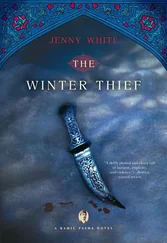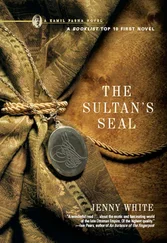Jenny White - The Abyssinian Proof
Здесь есть возможность читать онлайн «Jenny White - The Abyssinian Proof» весь текст электронной книги совершенно бесплатно (целиком полную версию без сокращений). В некоторых случаях можно слушать аудио, скачать через торрент в формате fb2 и присутствует краткое содержание. Жанр: Исторический детектив, на английском языке. Описание произведения, (предисловие) а так же отзывы посетителей доступны на портале библиотеки ЛибКат.
- Название:The Abyssinian Proof
- Автор:
- Жанр:
- Год:неизвестен
- ISBN:нет данных
- Рейтинг книги:4 / 5. Голосов: 1
-
Избранное:Добавить в избранное
- Отзывы:
-
Ваша оценка:
- 80
- 1
- 2
- 3
- 4
- 5
The Abyssinian Proof: краткое содержание, описание и аннотация
Предлагаем к чтению аннотацию, описание, краткое содержание или предисловие (зависит от того, что написал сам автор книги «The Abyssinian Proof»). Если вы не нашли необходимую информацию о книге — напишите в комментариях, мы постараемся отыскать её.
The Abyssinian Proof — читать онлайн бесплатно полную книгу (весь текст) целиком
Ниже представлен текст книги, разбитый по страницам. Система сохранения места последней прочитанной страницы, позволяет с удобством читать онлайн бесплатно книгу «The Abyssinian Proof», без необходимости каждый раз заново искать на чём Вы остановились. Поставьте закладку, и сможете в любой момент перейти на страницу, на которой закончили чтение.
Интервал:
Закладка:
Jenny White
The Abyssinian Proof
1
Constantinople, May 28, 1453
Isaak Metochites and his family set off through the unlit streets. His son, Michael, pulled the cart with their belongings, its wheels greased and padded to make no sound. His wife and seven-year-old daughter, cloaked in dark veils, followed behind. Constantinople lay about them in a black stupor, as close to sleep as death is to the afterlife.
The silence worried Isaak. For weeks, the Turks had kept up a fierce bombardment, along with a constant barrage of noise from trumpets and castanets, presumably to weaken the nerves of the city’s defenders. Only seven thousand armed men remained to defend the city, he thought, but they were not so easily rattled. It was rumored that the Turks planned a great attack the following day and the sudden silence seemed like a great ingathering of breath by the barbarian god of war.
The night smelled of wet charcoal and decay. Isaak thought he heard the Turkish army stirring on the other side of the city walls. He shook his head sadly at the thought that all that remained of the thousand-year-old civilization of Byzantium was this despairing city, the flat of the Muslim hand against its back, ready to tip it into oblivion. Over generations, the Turks had swallowed the outlying cities and provinces of the Eastern Roman Empire, the high plains, pastures, ports, and olive groves of Byzantium, until only the capital city remained, the city Constantine had named after himself in the year 330 and anointed the capital of Christendom. A triangle of precious civilization girded by its great walls and flanked on two sides by water.
In the spring of 1453, Sultan Mehmet II, the ambitious leader of the Turks, barely out of his teens, had built a fortress on the Bosphorus strait at its narrowest point, cutting off provisions to the city from the north. It was rumored that the young sultan, whose favorite stories were the biographies of Alexander and Caesar, had piled stone upon stone alongside his men.
Now the Turks were camped outside the city, preparing their final attack. From the land wall he had seen them pitch their elaborate tents amid a sea of soldiers in red turbans and glinting helmets. An enormous iron chain sealed the entrance to the harbor, the Golden Horn, but a month ago the Turks had shocked the population by transporting seventy-two ships by land, rolling them on greased logs over the hill of Pera into the harbor, trapping the Byzantine fleet. Then they flung a bridge of barrels across the Golden Horn and began to mine the city walls. The Venetians had promised to send their fleet to protect the city, but it had not appeared and soon it would be too late. Another Turkish fleet was approaching that would block the Sea of Marmara to the south.
Sprawled along the harbor, Constantinople had become a dark and lawless place. All who could had fled south before the blockade. The day before, Isaak had passed a man roasting a rodent on a small fire beneath the lower walls. Of rats there seemed these days to be an unlimited number. They stopped even in daylight in the middle of a lane, as if to remind the remaining humans that they would soon be evicted. The night before, Isaak had dreamed of his wife lying naked on a sandy shore, the tide coming in. Jolted awake, he had reached for Achmet’s Dream Key and read that if a man dreamed of his wife naked, he would see her grave.
Isaak and his family pulled their cart past a grove of olive trees beyond which rose the high wall enclosing the property of the Studion Monastery. Isaak halted by an iron gate surmounted by a double eagle, then felt his way along the wall until he came to a low door.
He took out a key, recently oiled, and inserted it into the lock. To his relief, it turned easily. He edged the door open, careful not to make a sound. His son unloaded the cart and, ducking under the lintel, passed everything inside to his father. Isaak noticed the palms of his hands were stained black by rust, as if the door were already covered in blood.
The family crouched low and hurried through the monastery garden to a small chapel. Isaak whispered instructions to his son, a young man of twenty, who crept back through the garden to get the rest of their belongings. They slipped out of the chapel toward the crypt, a square hole in the ground covered by an iron grate. As they left, Isaak passed his finger through the chapel’s holy spring and anointed his daughter’s forehead. Beside the crypt, he kept an anxious eye on the caretaker’s quarters, a cottage built against the wall at the other end of the garden. The monastery was quiet. All the monks were in the main church. He could hear the rhythmic drone of their voices praying for deliverance. His son lifted the grate and Isaak made his way gingerly down the steps, his eyes useless in the dark, hands groping for the passage he knew to be there.
The air was cool and the walls wept with damp. Isaak’s fingers felt along the slick stone, stumbling into burial niches until they found the cleft, hidden at the far end of the crypt behind a massive sarcophagus. He pulled himself through, and his son followed with their belongings. Deep under the earth, they lit torches.
Isaak returned to the garden to help his wife down the stairs, then lowered his daughter into the crypt, pressing his hand over her mouth to stifle her protests. There was a commotion below, then silence. Isaak took a last breath of the cool night air and spent a moment to consider the cold blanket of stars that would as soon crown a Muslim city as a Christian one, then moved back underground.
Behind the cleft, a tunnel led to an iron door. Isaak pushed it open. “This cistern has a passageway that goes under the city wall right to the sea,” he explained to his family, their frightened faces looming in the weak light of the flares. “The boat is docked by the Golden Gate, not far.” He hoped they would not be too late. He had remained in the city until the last minute, waiting for his partner’s ship, for a reprieve, for the promised Venetian fleet to arrive and rout the Turks.
A scrap of air tore at the flame of Isaak’s torch as he stepped inside the cistern. Stone columns rose about him, textured by marks of ancient chisels. High above, invisible beyond the arc of torchlight, was a ceiling of vaulted domes. He could just make out the glimmer of white marble, hints of their ornate capitals, and he wondered who had constructed these elaborate underground cathedrals that held the city’s water supply. Had they given refuge to the earliest Byzantines when they too were under siege? How else to explain the warren of tunnels that connected the cisterns to churches and to the palace, and burrowed secretly under the city walls to the shore.
Isaak breathed in the musty odor of decay. Below the tiled platform on which he stood, a lake of water receded into the darkness, rocking shards of light from his torch-water born in the mountains and brought overland by the aqueduct to serve the monastery. He checked to make sure the rowboats were there, tied up to the platform.
As father and son labored to carry the bundles into the cavernous room, one of the sacks fell open, revealing a gold plate, a ruby-studded chalice, and a gold incense burner. Isaak squatted down and, propping his torch against a pillar, opened the sack he was carrying. He spread a clean cloth on the tiles, then took out a purple velvet bundle heavily embroidered in gold. He undid the gold braid that tied it, revealing a simple silver gilt box, one hand’s breadth wide and two long.
He regarded the reliquary with awe. It was the reason he was here and not manning the ramparts alongside Constantine XI, his emperor. God forbid-he crossed himself-perhaps the last emperor of Byzantium. The box would remain with Isaak and, upon his death, pass to his son, to be given to his eldest son. Now he had no choice; they must take the reliquary out of the city. It must not fall into the hands of the Muslims. Travelers who had been to Cairo and Baghdad had told him that entire libraries were devoted to writings about the object lying on the velvet cloth at his feet. The Muslims knew it was here; perhaps this was the very reason the Turks were storming the city. The reliquary would make them more powerful than any weapon they currently possessed. Isaak planned to take it to Venice, where his family had connections and could safeguard it in secrecy. A future generation of Metochites sons must return it to Byzantium when the city was once again safe in Christian hands.
Читать дальшеИнтервал:
Закладка:
Похожие книги на «The Abyssinian Proof»
Представляем Вашему вниманию похожие книги на «The Abyssinian Proof» списком для выбора. Мы отобрали схожую по названию и смыслу литературу в надежде предоставить читателям больше вариантов отыскать новые, интересные, ещё непрочитанные произведения.
Обсуждение, отзывы о книге «The Abyssinian Proof» и просто собственные мнения читателей. Оставьте ваши комментарии, напишите, что Вы думаете о произведении, его смысле или главных героях. Укажите что конкретно понравилось, а что нет, и почему Вы так считаете.












